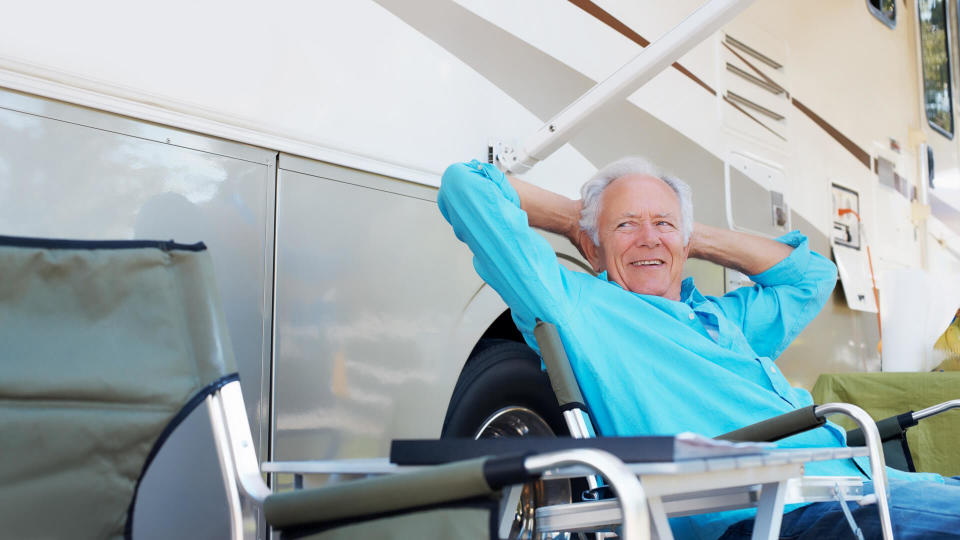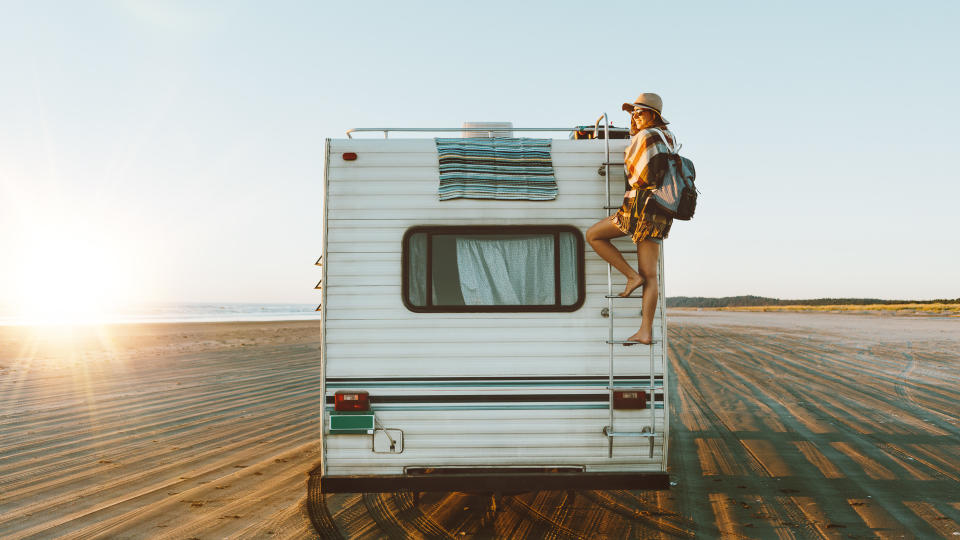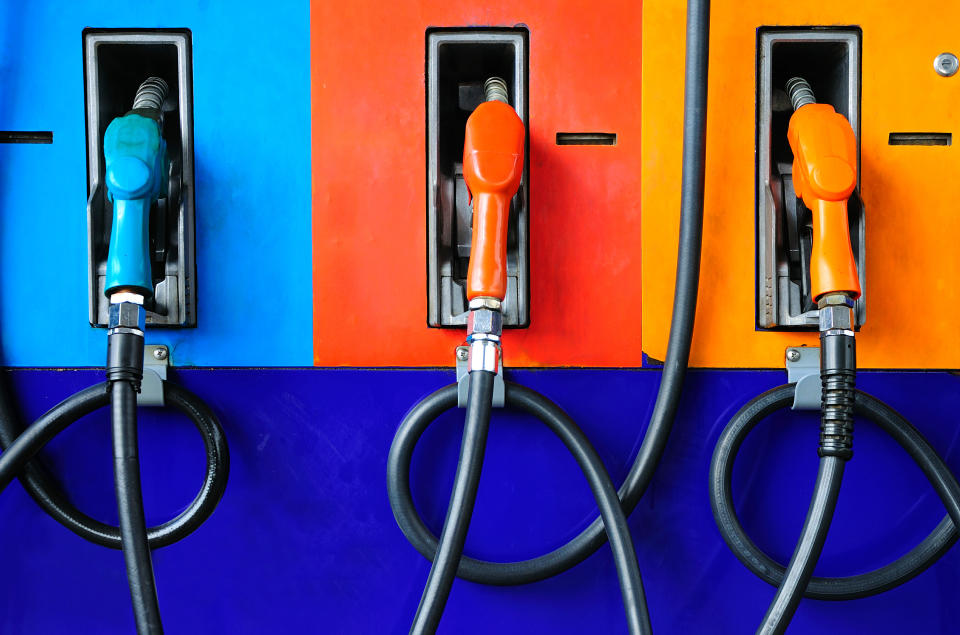6 Simple Ways To Cut Costs on Your RV Trip

Certain things have become synonymous with the coronavirus pandemic: Sourdough bread, Zoom calls, remote learning. In terms of pandemic travel, it’s the RV trip.
Read: Why It’s Smart To Book Your Late 2021 Travel Now
According to a report last month from the RV Industry Association, 2020 was on par with the third-best year on record for RV sales (2017), despite a two-month industry shutdown. The report projects that 2021 could break the 2017 record of 502,582 units shipped — though it also notes that this surge is also part of a longer-term trend of solid growth over the last four decades.
“RVing is the perfect way to travel during a pandemic,” said Kelly Beasley, co-founder of Camp Addict, a website dedicated to informing RV consumers. “You are self-sustained. You can choose to have as little interaction with the public as you can get away with. You’re bypassing airplanes, trains, buses, cruise ships, etc. It’s your own private little hotel room on wheels.”
Whether you’re a seasoned road warrior or just beginning to get your wheels dirty, check out these tips from RV travel experts for keeping your costs low the next time you take your private hotel out on the road.
Last updated: Feb. 19, 2021

1. Stay Longer
When planning your itinerary, consider longer stays at RV parks, suggests Tina Klinefelter, who used to work in the financial industry, but now runs the RV travel blog Free As Wheel Ever Be.
Weekly and monthly rates are much lower than daily rates in general, she said. In an email written from an RV resort in Florida, Klinefelter said at her current location, the daily rate is $70, the weekly rate is $390 (for a $100 savings) and the monthly rate is $965 + electric (more than $1,000 in savings).
See: The 20 Industries That Will Never Be the Same After the Coronavirus

2. Check Out State and County Campgrounds
If you’re willing to forego the amenities of pricey RV resorts such as private pools, restaurants and laundry, you can save considerable amounts of money at state and county campgrounds. These sites, which run in the $10-$15 nightly range, beat other privately owned campgrounds as well, which typically cost around $25 a night.
Beasley said state and county campgrounds also have an advantage in terms of safer social distancing. “Privately held campgrounds’ sole purpose is to make as much money as possible,” she said. “This means tighter sites, more sites and many potential COVID-lurking packages walking around or through your site.”
Find Out: How To Plan Future Travel Without Risking Your Deposits

3. Join Camping Clubs
If you know you’re going to be camping a lot, Klinefelter recommends paying an upfront membership fee for camping clubs that can help save you money on single-night stays when traveling between locations.
An annual camping pass with Thousand Trails costs $499 and covers nightly stays at around 200 RV resorts and campgrounds across the country.
Harvest Hosts charges $79 a year for free camping at locations like wineries, breweries, farms and museums.
Boondockers Welcome is a network of private landowners who welcome RVers to stay on their properties (amenities are typically minimal). The yearly fee is just $50.
If you’re willing to go completely off the grid, Campendium is a directory of public lands where you can stay for no fee at all, such as national forests, state trust and Bureau of Land Management lands. Many campers appreciate the isolation and remoteness these locations can offer. Just be prepared to be fully self-sufficient and exercise strict Leave No Trace principles (which you should do anywhere you camp, of course).
More: 33 Things You Definitely Do NOT Need To Buy During the Coronavirus Pandemic

4. Bring Your Own Food
If your RV has a fridge and/or stovetop, skipping the restaurants and fast food stops in favor of cooking yourself will save on food costs. “On travel days, pre-plan easy meals to avoid fast food expenses,” Klinefelter said. “If you do your grocery shopping before your trip, you may save money, especially if you plan to travel to locations with a higher cost of living.”
Plus, Beasley adds, avoiding restaurant dining is a much safer option.
Read: 30 Ways Shopping Will Never Be the Same After the Coronavirus

5. Fuel Up Away From the Interstate
Travelers often find gas prices to be higher closer to the interstate and in more populated areas, so Klinefelter prefers to avoid these areas for fuel stops.
Check out apps like GasBuddy, Waze and AAA Mobile that help travelers compare updated gas prices. They also offer a variety of different useful features like helping you find restroom facilities and restaurants, check road conditions and flag speed traps.
If you can, try to fill the tank on Mondays or Tuesdays. According to an analysis by GasBuddy, prices at the pump average the lowest on Mondays in 30 states during the summer travel season, with weekend days climbing higher.
See: 20 Highest-Paying Jobs That Let You Travel the World

6. Avoid Tourist Traps
What’s true for hotels is true for camping areas as well: Prices tend to be higher the closer you get to touristy areas. “The farther you stay from a tourist area such as Disney World or Bourbon Street, the less you will usually pay on a daily, weekly or monthly basis,” Klinefelter said.
Beasley is also a fan of skipping the attractions like theme parks and going sightseeing in nature instead. “Getting into nature is one of the best perks of hitting the road in an RV. And it’s usually free,” she said. You can pick up a National Parks Pass for $80, which covers unlimited yearly visits for you and anyone in your car.
More From GOBankingRates
This article originally appeared on GOBankingRates.com: 6 Simple Ways To Cut Costs on Your RV Trip

 generic
generic 